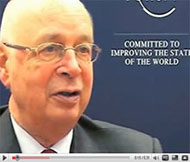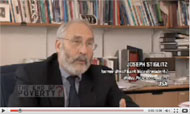
See this year's leading lights discuss the initiatives

Watch anti-poverty experts speak of the problem and its solutions
| Human Rights | |
| Local Governance | |
| Food Sovereignty | |
| Capital Flight | |
| Sane Tax | |
| Debt Relief | |
| Climate Change |
 See this year's leading lights discuss the initiatives
|
|
What can be the role of world leaders and influencers in ending poverty now?
We don't need, right now, a hundred initiatives. A few simple steps will take us a very great distance towards vanquishing the primary threat to civilized life on earth. And at this year's meeting, a number of the world's prime movers and shakers are committing to these momentous yet logical steps. Click on the links below to see key leaders discuss each idea. Human Rights Initiative: The global guarantee of food, drinking water, shelter, healthcare, education, as basic human rights that must be provided free to all. Local Governance Initiative: An end to private monopoly ownership over natural resources, with a minimum 51% local communal ownership in corporations that control such resources. The termination of intellectual property rights on pharmaceutical drugs. Food Sovereignty Initiative: A total redistribution of idle lands to landless farmers and the imposition of a 50% cap on arable land devoted to products for export per country, with the creation of a worldwide subsidy for organic agriculture. Capital Flight Initiative: The termination of tax havens around the world as well as free flow of capital in developing countries. This will immediately result in billions of dollars of tax revenue per year for developing countries that can be used for infrastructure development and improvement of basic services. Sane Tax Initiative: The cancellation of taxes on labor and basic consumption, the creation of a 2% worldwide tax on property ownership (except basic habitation for the poor), and the implementation of a global 0.5% flat tax on all financial transactions with a total prohibition of speculation on food products. Debt Relief Initiative: The immediate cancellation of international debt by all developing countries, with no reciprocal obligations, and the payment of compensation to Third World countries for historical as well as ecological debt. Climate Debt Initiative: A commitment by industrialized countries to decrease carbon emission by 50% within ten years and to reduce by 25% consumption of natural resources over the same period. Watch this year's leading lights discuss these measures here. See also the press release. |